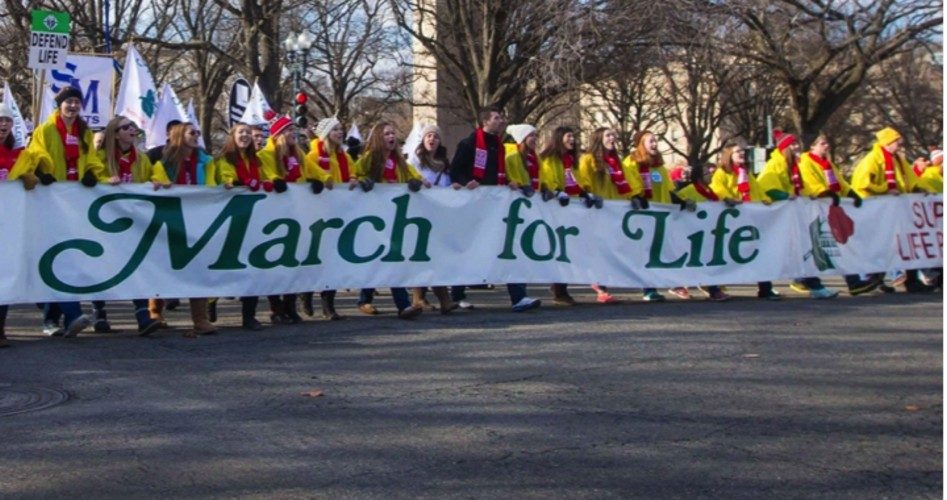
A federal judge in Washington issued a ruling on Monday in favor of the pro-life group March for Life against the federal contraception mandate. The 29-page ruling from U.S. District Judge Richard Leon could change the debate over the requirement that contraceptives for women be included among cost-free, preventative benefits.
Under ObamaCare, employers’ health insurance plans are mandated to cover contraceptives without copayment, provoking ire from business owners with deeply held religious convictions that make them morally opposed to certain forms of birth control. The Washington Times observes, “Many Catholic groups objected to all forms of contraception, while evangelical groups and others said they’re only opposed to ‘morning-after’ pills such as Plan B and ella, which they equate with abortion.”
The mandate has been challenged by a number of religious nonprofits and religious business owners that have argued that they should not have to pay for something that violates their beliefs.
March for Life, an organization founded in 1973 after the Supreme Court’s Roe v. Wade opinion, sued the Obama administration last year over the contraception mandate. Challenges to the mandate have mostly involved faith-based objections, but March for Life is not associated with any particular religion. It argues against the mandate as a violation of the group’s moral convictions, not religious.
March for Life contends it is unconstitutional for the federal government to allow exemptions for religious organizations but not for nonreligious organizations that contest the law on ethical grounds.
Judge Leon agreed with the group’s assertion, stating the mandate was unconstitutional because it treats religious and nonreligious groups differently. According to Judge Leon, March for Life closely resembles religious groups in that its employees do not wish to use birth control, and that the U.S. Department of Health and Human Services created a framework of “regulatory favoritism.”
“March for Life has been excised from the fold because it is not ‘religious,’” Leon writes. “This is nothing short of regulatory favoritism.”
“The characteristic that warrants protection — an employment relationship based in part on a shared objection to abortifacients — is altogether separate from theism. Stated differently, what H.H.S. claims to be protecting is religious beliefs, when it actually is protecting a moral philosophy about the sanctity of life,” he continues.
“H.H.S. may be correct that this objection is common among religiously affiliated employers,” he added. “Where H.H.S. has erred, however, is in assuming that this trait is unique to such organizations. It is not.”
“HHS provides no principled basis, other than the semantics of religious tolerance, for its distinction,” Leon wrote. “If the purpose of the religious employer exemption is, as HHS states, to respect the anti-abortifacient tenets of an employment relationship, then it makes no rational sense — indeed, no sense whatsoever — to deny March [for] Life that same respect.”
Judge Leon also noted that the healthcare law, as written, left employees with few options. “They can either buy into and participate in a health insurance plan that includes the coverage they find objectionable and thereby violate their religious beliefs,” Judge Leon wrote, “or they can forgo health insurance altogether,” subjecting themselves to penalties under the healthcare law.
Alliance Defending Freedom, the group whose lawyers represented March for Life, observes that Judge Leon’s decision was the first to recognize the rights of a nonreligious group in the fight against the contraceptive mandate. “There’s no reason the government should treat them negatively because their views on abortion are based on science instead of being based on religion,” Alliance’s senior legal counsel Matt Bowman said, adding that Judge Leon recognized the “irrationality of forcing a pro-life organization to provide anti-life items in their health insurance.”
Judge Leon’s decision is likely to be appealed.
The Associated Press notes that there have been approximately 100 lawsuits from businesses and religiously affiliated colleges, hospitals, and other non-profit organizations challenging the contraception mandate.
While other religious groups have been told that they do not have to comply with the mandate, they are required to inform the federal government of their objections, a requirement that is “at the heart of lawsuits over the mandate,” the AP writes.
Thus far, federal appeals courts have ruled that the requirement to inform the government of the religious objection does not violate the rights of the business owners, but several appeals are waiting at the Supreme Court.
A 2014 ruling by the Supreme Court determined that the Department of Health and Human Services cannot compel owners of Christian-based businesses to violate their own religious beliefs to adhere to the mandate. The 5-4 ruling came in favor of two family-held companies — Hobby Lobby, owned by the Green family, and Conestoga Wood Specialties, owned by the Hahn family — both of whom had said that the mandate would represent an unacceptable moral obstacle to their businesses.
The majority opinion cited the Religious Freedom Restoration Act (RFRA), asserting that the federal Department of Health and Human Services cannot force owners of Christian-based businesses to violate their convictions to adhere to the mandate. “In holding that the HHS mandate is unlawful, we reject HHS’s argument that the owners of the companies forfeited all RFRA protection when they decided to organize their businesses as corporations rather than sole proprietorships or general partnerships,” wrote Justice Alito for the majority in the two cases. “The plain terms of RFRA make it perfectly clear that Congress did not discriminate in this way against men and women who wish to run their businesses as for-profit corporations in the manner required by their religious beliefs.”
That ruling did not prevent employees from receiving birth control, but provided them an opportunity to pursue birth control through the businesses’ insurers or through third-party administrators, at the expense of the federal government.




